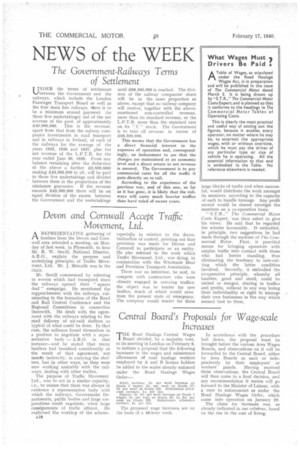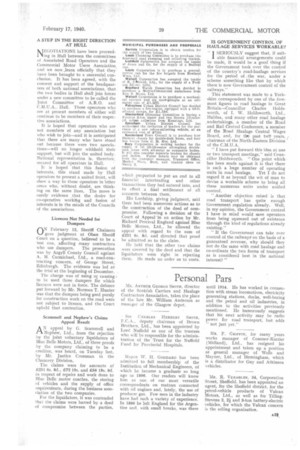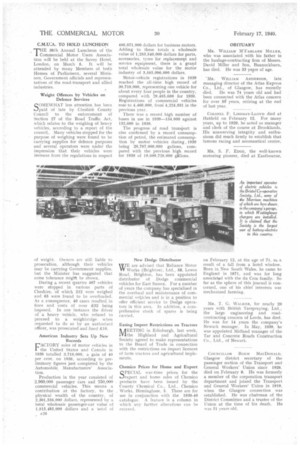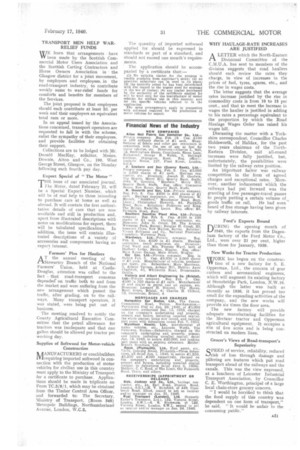NEWS of the WEEK
Page 20

Page 21

Page 22

Page 23

If you've noticed an error in this article please click here to report it so we can fix it.
The Government-Railways Terms of Settlement
UNDER the terms of settlement between the Government and the railways, which include the London Passenger Transport Board as well as the four main line railways, there is to be a minimum annual payment (to those five undertakings) out of the net revenue of the pool, of approximately £40,000,000. This is the revenue, apart from that from the railway companies investments in road transport and in railways in Ireland, of each of the railways for the average of the years 1935, 1936 and 1937, plus the net revenue of the L.P.T.B. for the year ended June 30, 1939. From any balance remaining after the deduction of the above a further £3,500,000? making £43,500,000 in all, will be paid to those five undertakings and divided between them in the proportions of the minimum guarantee. If the revenue exceeds £43,500,000 there will be an equal division of the excess between the Government and the undertakings
until £68,500,000 is reached. The division of the railway companies' share will be in the same proportion as above, except that no railway company will receive, together with the abovementioned non-controlled revenue, more than its standard revenue, or the L.P.T.B. more than the standard rate on its " C" stock. The Government is to take all revenue in excess of £68,500,000.
This means that the Government has a direct financial interest in the expenses of operation and, correspondingly, an inducement to see that the charges are maintained at an economic level and a direct return in net revenue is assured. The Government is to pay commercial rates for all the traffic it puts directly on to rail.
According to the experience of the previous war, and of this one, so far as it has gone, it is likely that the railways will carry much heavier traffics than hav4 ruled of recent years.
A STEP IN THE RIGHT DIRECTION AT HULL
NEGOTIATIONS have been proceeding in Hull between the committees of Associated Road Operators and the Commercial Motor Users Association. and we now ,learn officially that they have been brought to a successful conclusion, It has been agreed, with the consent and support of the headquarters of both national associations, that the two bodies in Hull shall join forces under a new committee to be called the joint Committee of A.R.O. and C.M.U.A., Hull. Those operators who are at present members of either will continue to be members of their respective associations.
It is hoped that operators who are not members of any association but who wish to join—and it is anticipated that there are many who have stood out because there were two associations—will no longer withhold their support, but will join the united body. National representation is, therefore, secured for all operators in Hull.
It is hoped that this fusion of interests, this stand made by Hull operators to present a united front, will show a way to those operators in 'other areas who, without doubt, are thinking on the same lines. The move is surely evidence . that the desire for co-operative workitg and fusion of interests is in the minds of the Councils of the associations.
Licences Not Needed for Dumpers
ON February 12, Sheriff Chalmers gave judgment at Oban Sheriff Court on a question, believed to be a test one, affecting many contractors who use dumpers. The prosecution was by Argyll County Council against A. M. Carmichael, Ltd., a road-contracting concern, of George Street, Edinburgh. The evidence was led at the trial at the beginning of December.
The charge was of using or causing to be used three dumpers ?Or which licences were not in force, The defence put forward by Mr. Norman T. Hunter was that the dumpers being used purely for construction work on the road were not subject to licence, and the Court upheld that contention.
Scammell and Nephew's Claims Appeal Result
ANappeal by G. Scammell and Nephew, Ltd., from the rejection by the joint voluntary liquidators of Blue Belle Motors, Ltd., of three proofs by the company claiming to be a creditor, was heard, on Tuesday last, by Mr. Justice Crossman in the Chancery Division.
The claims were for amounts of £251 6s. 8d., 072 10s. and £56 18s. 9d. in respect of repairs and work done to Blue Belle motor coaches, the storing of vehicles and the supply of office iequirentents, during the business association of the two companies.
For the liquidators, it was contended that the claims were barred by a deed of compromise between the parties,
which purported to put an end to all financial intertrading and other transactions they had entered into, and to effect a final settlement of all accounts between them: His Lordship, giving judgment, said there had been numerous actions as to the construction of the deed of compromise. Following a decision of the Court of Appeal' in an action by Mr. Richard Percival England against Blue Belle Motors, Ltd., he allowed the appeal with regard to the sum of E251 6s. 8d. and directed that proof he admitted as to the claim.
He held that the other two claims were covered by the deed and that the liquidators were right in rejecting them. He made no order as to costs,
IS GOVERNMENT CONTROL OF HAULAGE SERVICES WORKABLE?
"
I SERIOUSLY suggest that, if suitable financial arrangements could be made, it would be a good thing if the Government took over the control -of the country's road-haulage services for the period of -the war, under a scheme something like that by which there is now Government control of the railways." This statement was made to a Yorkshire correspondent by one of the foremost figures in road haulage in Great Britain—Councillor Charles Holdsworth, of I. W. Holdsworth, Ltd., Halifax, and many other road haulage undertakings, a member of the Road and Rail Central Conference, a member of the Road Haulage Central Wages Board, and, for the past terr5 years, / chairman of the North-Eastern Division of the C.M.U.A.
" I have put forward this idea at one or two transport meetings," said Councillor Holdsworth. "One point which • has been made against it is that there is such a huge number of operating units in road haulage. Yet I do not regard it as beyond the wit of man to devise a workable scheme to bring all these numerous units under unified control.
"Another objection raised is that road transport has quite enough Government regulation already. Well, in my opinion, the Government control I have in mind would save operators from being squeezed out of existence through the kind of regulations already existing."
" If the Government can take over control of the railways on the basis of a guaranteed revenue, why should they not do the same with road haulage and co-ordinate the two forms of transport as is considered best in the national interest?" C.M.U..A. TO HOLD LUNCHEON
THE 36th Annual Luncheon of the Commercial Motor Users Association will be held at the Savoy Hotel, London, on March 6. It will be attended by many Members of both Houses of Parliament, several Ministers, Government officials and representatives of the road-transport and allied industries.
Weight Offences by Vehicles on Defence Services SOMEWHAT less attention has been paid of late by Cheshire County Council to the enforcement of Section 27 of the Road Traffic Act, which relates to the weighing of heavy vehicles, according to a report of the council. Many vehicles stopped for the purpose of weighing were found to be carrying supplies for defence purposes and several operators were under the impression that their vehicles were immune from the regulations in respect
of weight. Owners are still liable to prosecution, although their vehicles may be carrying Government supplies, but the Minister has suggested that some tolerance might be shown, During a recent quarter 407 vehicles were stopped in various parts of Cheshire, of which 212 were weighed and 65 were found to be overloaded. As a consequence, 40 cases resulted in fines and costs of over £52 being imposed. In one instance the driver of a heavy vehicle, who refused to proceed to a weighbridge when requested to do so by an authorized officer, was prosecuted and fined £10.
American Industry Sets Up New Records
rACTORy sales of motor vehicles in the United States and Canada in 1939 totalled 3,710,000, a gain of 40 per cent, on 1938, according to preliminary figures j.ust completed by the Automobile_ Manufacturers' Association.
Production in the year consisted of 2,960,000 passenger cars and 750,000 commercial vehicles. This means a contribution at the factory, to the physical wealth of the country, of 2,301,556,000 dollars, represented by a total wholesale passenger-car value of 1,815,445,000 dollars and a total of A20 486,071,000 dollars for business motors. Adding to these totals a wholesale value of 1,283,540,000 dollars for parts, accessories, tyres for replacement and service equipment, there is a grand total wholesale value for the motor industry of 3,585,096,000 dollars.
Motor-vehicle registrations in 1939 reached the all-time high record of 30,710,000, representing one vehicle for about every four people in the country, compared with 29,485,680 for 1938. Registrations of commercial vehicles rose to 4,460,000, froni 4,224,031 in the previous year.
There was a record high number of buses in use in 1939-134,000 against 132,600 in 1938.
The progress of road transisort is also confirmed by a record consumption of petrol, the estimated consumption by motor vehicles during .1939 being 20,787,000,000 gallons, compared with the previous high record for 1938 of 19,609,728,000 Onions.
New Dodge Distributor
WE are advised that Reliance Motor Works (Brighton), Ltd., 58, Lewes Road, Brighton, has been appointed distributor of Dodge commercial vehicles for East Sussex. For a number of years the company has specialized in the overhaul and maintenance of commercial vehicles and is in a position to offer efficient service to Dodge operators in this area. In addition, a comprehensive stock of spares is being carried.
Easing Import Restrictions on Tractors AEETING in Edinburgh, last week, althe Highland and Agricultural Society agreed to make representations to the Board of Trade in connection with the restrictions on import licences of farm tractors and agricultural implements.
Chemico Prices for Home and Export
SPECIAL war-time prices for the )export and home sales of Chemico products have been issued by the County Chemical Co., Ltd., Chemico Works, Birmingham, 5. These are for use in conjunction with the 1939-40
• catalogue. A feature is a column in which any further alterations can be entered. OBITUARY
MR. WILLIAM' MTARLANE MILLER,
who was associated _with his father in the haulage-contracting firm of Messrs. David Miller and Son, Bannockburn, has died. He was 33 years of age.
Mn. WILLIAM ANDERSON, late managing director of the Atlas Express Co., Ltd., of Glasgow, has recently died. He was 74 years old and had been connected with the Atlas concern for over sd years, retiring at the end of last year, COLONEL F. LINDSAY-LLOYD died at Hatfield on February 12, For many years, up to 1929, he acted as manager and clerk of the course at Brooklands. His unswerving integrity and enthusiasm did much firmly to establish that famous racing and aeronautical centre.
MR. S. F. EDGE, the well-known motoring pioneer, died at Eastbourne, on February 12, at the age of 71, as a result of a fall from a hotel window. Born in New South Wales, he came to England in 1871, and was for long associated with the du Gros family. So far as the sphere of this journal if concerned, one of his chief interests was mechanized farming.
MR. T. G. WALKER, for nearly 20 years with British Tarspraying, Ltd., the large engineering and roadcontracting concern of Leeds, has died. He was for 14 years the company's Newark manager. In May, 1939, he was appointed Midland manager of the Tar and Concrete Roads Construction Co., Ltd., of Newark.
COUNCILLOR ROEW MACDONALD, Glasgow district secretary of the passenger section of the Transport and General Workers' Union since 1926, died on February 8. He was formerly a member of the corporation transport department and joined the Transport and General Workers' Union in 1919, when the Glasgow connection was established. He was chairman of the District Committee and a trustee of the Union at the time of his death. He was Si years old. TRANSPORT MEN HELP WARRELIEF FUNDS
WE learn that arrangements • have been made by the Scottish Commercial Motor Users Association and the Scottish Carting Contractors and Horse Owners Association in the Glasgow district for a joint movement, by employers and employees, in the road-transport industry, to contribute weekly sums to war-relief funds for comforts and benefits for members of the Services.
The joint proposal is that employees should each contribute at least 2d. per week and their employers an equivalent total sum or more. .
In an appeal issued by the Associations concerned, transport operators are requested to fall in with the scheme, enlist the sympathy of their employees, and provide facilities for obtaining their support.
Collections are to be lodged with Mr. Donald MacKay, solicitor, Messrs. Downie, Alton and Co., 190, West George Street, Glasgow, on the Monday following each fourth pa Y day.
Export Special of "The Motor"
THE issue of our associated journal, The Motor, dated February 21, will be a Special Export Number, which will be of real help to those intending to purchase cars at home as well as abroad. It will contain the first authoritative details of cars that are now available and still in production and, apart from illustrated descriptions with notes on modifications for export, there will be tabulated specifications. In addition, the issue will contain illustrated descriptions of a variety of accessories and components having an export interest.
Farmers' Plea for Hauliers AT the annual meeting of the Stewartry Branch of the National Farmers' Union, held at CastleDouglas, attention was called to the fact . that road-transport concerns depended' on traffic both to and from the market and were suffering from the new arrangement which passed the traffic, after grading, on to the railways, Many transport operators, it was stated, were being put out of business.
The meeting resolved to notify the County Agricultural Executive Committee that the petrol allowance for tractors was inadequate and that one gallon should be allowed per tractor per working day.
Supplies of Softwood for Motor-vehicle Construction UTANUFACTURERS or coachbuilders IV1requiring imported softwood in connection with the production of motor vehicles for civilian use in this country must apply to the Ministry of Transport for a certificate to purchase. Applications should be made in triplicate on Form TC.3/811, which may be obtained from the Timber Control Area Officer, and forwarded to: The Secretary, Ministry of Transport, (Room 349) Metropole Buildings, Northumberland Avenue, London, W.C.2.
The quantity of imported softwood applied for should be expressed in standards or part of a standard, and should not exceed one month's require ments.
'The application should be accom
panied by a certificate that:— )1) No suitable Umber for the purpose is readily available from applicant's stock; (2) no practical substitute can be used in its place; (3) the quantity asked for has been determined with due regard to the urgent need for economy in the use of timber; (4) any timber purchased by the authority of the certificate applied for wilt be used only for the manufacture of motor vehicles for civilian use in this country, and for the specific vehicles referred to in the application.
The some arrangements apply In connection with softwood required for the production of mo-r, vehicles for export.
WHY HAULAGE-RATE INCREASES ARE JUSTIFIED
ALETTER which the North-Eastern Divisional Committee of the C.M.U.A. has sent to members of the division suggests that road hauliers should each review the rates they charge, in view of increases in the prices of fuel, tyres, spares, etc., and the rise in wages costs.
The letter suggests that the average rates increase justified by the rise in Commodity costs is from 10 to 15 per cent., and that to meet the increase in wages the haulier is justified in adding to his rates a percentage equivalent to the proportion by which the Road Haulage Wages Order has raised his wages bill.
Discussing the matter with a Yorkshire correspondent, Councillor Charles Holdsworth, of Halifax, for the past two years chairman of the NorthEastern Division, said all-round increases were fully justified, but, unfortunately, the possibilities were limited by the railway rates position.
An important factor was railway competition in the form of agreed charges and exceptional rates. Moreover, another inducement which the railways had put forward was the granting of free passenger-travel passes to people putting a certain volume of
goods traffic on rail. He had even heard of free storage having been given by railway interests.
Ford's Exports Bound
DURING the opening month of 1940, the exports from the Dagenham factory of the Ford Motor Co., Ltd., were over 21 per cent. highei than those for January, 1939.
New Works for Tractor Production MORK has begun on the construeIN lion of a new factory for S. E. Opperman, Ltd„ the concern of gear cutters and aeronautical engineers, which will augment its existing factory at Stonebridge Park, London, N.W.10. Although the latter was built as acently as 1936, it has proved too small for the expanding activities of the company, and the new works will provide six times the floor area.
The new factory will provide adequate manufacturing facilities for the Mectaur tractor and Opperman agricultural equipment. It occupies a site of five acres and is being constructed on modern lines.
Grocer's Views of Road-transport's Superiority SPEED of service, reliability, reduced risk of loss through damage and pilfering are features which put road transport ahead of the railways and the canals. This was the view expressed, at a luncheon of Leicester Industrial Transport Association, by Councillor C. E. Worthington, principal of a large local chain-store grocery concern.
" I would be horrified to think that the food supply of this country was dependent on one form of transport," he said. " It would be unfair to the consuming public."




























































